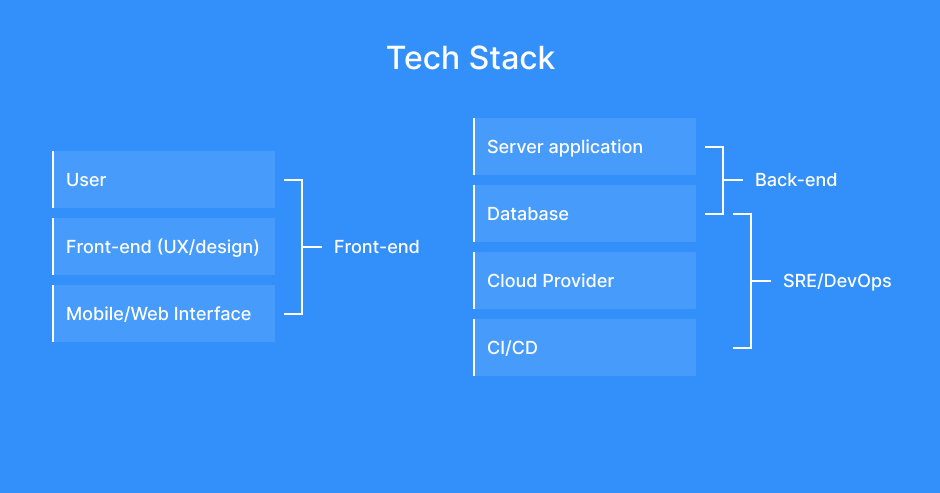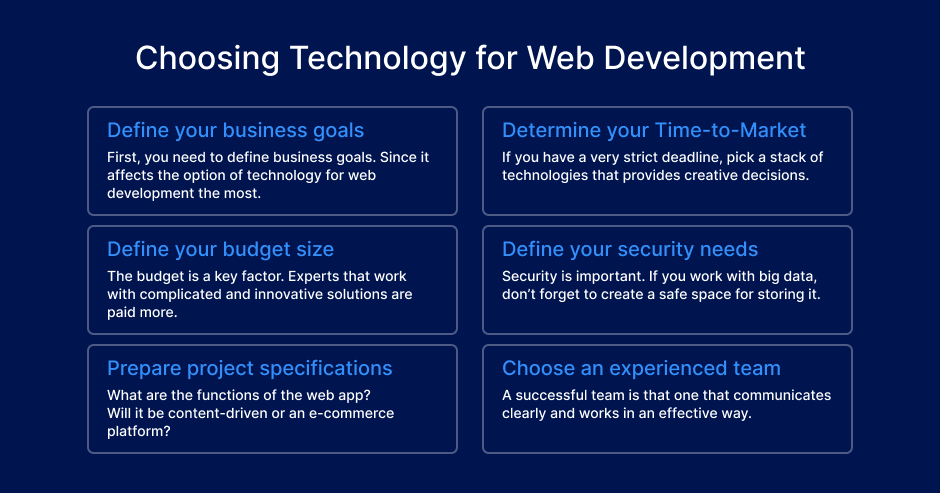Creating a digital product is like building a house – you need the right materials. Tools like JavaScript, Python, and PostgreSQL combine to form the tech stack, catering to various tech needs.
Your tech stack decisions shape:
- How well your application performs and grows
- The speed at which you develop
- Finding proficient developers
- Costs for project support and maintenance
Choosing the best tech stack for your remote team can be overwhelming. Don't worry! This guide will steer you toward making the optimal choice.
Looking for contractors, project-based developers, or dedicated teams with exceptional retention rates? Join unicorns, startups & scaleups, like Omio, Glopal, and Perforce who hired Index.dev contractors, tapping the elite 5% of vetted tech talent and saving up 40% on development →

Basic Concepts: Frontend and Backend
Frontend Tech Stack
Front-end developers play a crucial role in creating, implementing, and managing websites using HTML5, CSS3, JavaScript, and related tools. Here's a brief overview of their key responsibilities:
- Architecting the Frontend: They design user interfaces and collaborate with back-end developers for seamless integration, ensuring a well-structured and sustainable system.
- Designing User Interactions: Crafting visually appealing designs, responsive layouts, and a smooth user experience is their forte. They ensure websites are user-friendly and match the intended design.
- Crafting Code: Proficient in JavaScript, CSS, and HTML, they bring designs to life and add functionality to web applications. They use these languages to create pages, control appearance, and add features.
- Enhancing Performance: Front-end developers optimize site speed and scalability, ensuring compatibility across browsers and devices.
- Ensuring Responsiveness: They ensure websites work seamlessly on all devices, impacting vital business metrics like conversions and user retention.
Also read: How to hire Front-End developers effectively
Backend Tech Stack
Backend developers require strong skills in various programming languages, frameworks, libraries, database management, and API development. Key technical skills include:
- Programming Languages: Proficiency in languages such as Python, Java, Ruby, or PHP is crucial for backend development.
- Frameworks and Libraries: Knowledge of popular frameworks like Django, Ruby on Rails, or Laravel can streamline development and improve code quality.
- Database Management: Comfort working with systems like MySQL, PostgreSQL, or MongoDB to efficiently store and retrieve application data is essential.
- API Development: Creating and maintaining APIs that enable frontend access to server-side data and functionality is a critical skill for backend developers.
Our 8 factors for choosing the right tech stack for remote software development are outlined below.
Also read: How to hire the best Back-End developers
1. Understanding Your Project's Needs
Before choosing the right tech stack for your remote software team, it is essential to have a clear understanding of your project's needs. This involves assessing the size, scope, and complexity of your project, which will help you determine the key technologies and frameworks required for success. Identifying these critical components will allow you to align your tech stack with your project goals and deadlines, ensuring a smooth development process for your remote team.
Start by evaluating the scale of your project - is it a small, medium, or large-scale endeavor? Consider the features and functionality you want to include, and how these requirements may impact the technologies and frameworks you choose. Additionally, think about the timeframes for project milestones and completion, as this can influence your tech stack decisions.
Also read: C++ vs Rust: Is C++ being replaced by Rust
2. Considering Scalability and Future-Proofing
In today's rapidly evolving technological landscape, it is essential to consider the scalability and future-proofing aspects of your tech stack. This involves adapting to changing business needs and technology trends, which can impact the success of your remote software team and the projects they work on.
When choosing a tech stack, it is crucial to select technologies and frameworks that allow for seamless scaling of your remote team. This means considering how easy it is to onboard new team members, integrate additional tools and features, and accommodate growing project requirements. By selecting a scalable tech stack, you can ensure that your remote team is well-equipped to handle the challenges that come with growth and expansion.
Moreover, future-proofing your tech stack involves ensuring the longevity and relevance of your chosen technologies. As new tools and platforms emerge, it is vital to evaluate their potential impact on your remote team's work and make strategic decisions to keep your tech stack up-to-date. By staying abreast of industry trends and embracing innovation, you can future-proof your tech stack and set your remote software team up for long-term success.
Also read: What contract work is and how Index.dev handles it?
3. Community and Ecosystem Support
When choosing the right tech stack for your remote software team, it is essential to consider the community and ecosystem support available for the technologies and frameworks you select. This involves identifying popular and well-supported tools that have a strong following and an active community of developers and experts.
By leveraging community resources, your remote team can benefit from ongoing learning and problem-solving opportunities. This includes accessing online forums, tutorials, and documentation, which can help your team stay updated with the latest developments in the tech stack and overcome any challenges they may encounter during the development process. Additionally, a strong community presence can make it easier to find skilled professionals with experience in your chosen tech stack, further enhancing the capabilities of your remote software team.
4. Prioritizing Security and Compliance
As remote software teams handle sensitive data and confidential information, data protection and privacy become paramount. It is crucial to choose a tech stack with built-in security features that safeguard your data and ensure the integrity of your projects. Such features could include encryption, access controls, and secure communication protocols.
Additionally, your remote software team must adhere to industry best practices and compliances in order to maintain a secure development environment. This involves staying updated with the latest security guidelines, implementing proper coding standards, and adopting a proactive approach to identify and address potential vulnerabilities in your tech stack.
Skip the talent struggle. Connect with seasoned, expertly vetted engineers effortlessly. Get started in just 48 hours →
5. Evaluating Cost and Resource Management
When choosing the right tech stack for your remote software team, it is important to strike a balance between the cost of technologies and the benefits they provide. By carefully considering the investment in various tools and frameworks, you can ensure that your tech stack is cost-effective while still meeting your team's needs.
A great way to optimize costs is by opting for solutions like hiring contractors through platforms like Index. Contractors provide the skills and experience you need without the financial burden of traditional employment. They also bring in rich diversity of perspectives, skills, and market insights, which can be invaluable to your projects. Additionally, hiring contractors can help streamline administrative tasks, reduce recruiting overheads, and offer flexibility in scaling your team up or down as needed.
Another aspect of cost and resource management is ensuring your remote team members use their own equipment, reducing operational costs for your company. By having team members work remotely using their personal devices, you can save on expenses related to office resources and infrastructure, ultimately optimizing costs while maintaining productivity.
Also read: 10 highest-paying programming languages
6. Cross-Platform Compatibility and Performance
One of the critical aspects to consider when choosing the right tech stack for your remote software team is cross-platform compatibility and performance. Ensuring your tech stack supports multiple platforms and devices is essential, as it allows your team to cater to diverse user requirements and reach a wider audience.
Moreover, prioritizing performance optimization is crucial for a seamless user experience. Your remote software team should focus on optimizing the speed, responsiveness, and stability of your applications across different platforms. This involves using the right tools and techniques to minimize latency, reduce load times, and ensure smooth operation on various devices.
Adapting your technologies to cater to diverse user requirements is also vital for the success of your remote software team. This may involve incorporating responsive design principles, considering accessibility features, and testing your applications on a wide range of devices and platforms.
Also read → Flutter vs React Native vs Kotlin: Which cross-platform tool to choose
7. Team Training and Skill Development
Continuous learning is a vital component for remote software teams to stay competitive and keep their skills up-to-date. Providing your team with the necessary training and resources to excel in the chosen tech stack ensures that they remain knowledgeable and confident in their abilities. This not only enhances the overall team performance but also contributes to the success of your projects.
Investing in your remote team's professional development can take various forms, including online courses, workshops, and webinars tailored to the technologies and frameworks used in your tech stack. Encouraging your team to participate in these learning opportunities can expand their expertise and facilitate their growth as professionals.
Another essential aspect of skill development is fostering a culture of collaboration and knowledge sharing among team members. Encouraging open communication and the exchange of ideas can help your remote software team stay informed about the latest developments in their field and learn from each other's experiences. This collaborative environment can lead to more innovative solutions and enhanced problem-solving capabilities, ultimately benefiting your projects and driving your team's success.
Also read: Key strategies for upskilling and training remote developers

The Role of Index.dev in Managing Remote Software Teams
Index.dev plays a significant role in helping companies build and manage their remote software teams by providing a comprehensive suite of services and support. As an innovative platform, Index.dev enables businesses to tap into a curated network of experienced software engineers from around the world, giving them access to top talent that can strengthen their remote teams and drive project success.
Moreover, Index.dev streamlines the team management and payroll processes for companies, saving them valuable time and resources. By handling administrative tasks such as payments, contracts, and taxes, Index.dev allows companies to focus on their core business activities and maximize their team's productivity.
Finally, Index.dev is committed to supporting companies throughout the entire process of scaling their remote teams. By providing guidance, resources, and expertise, Index.dev ensures that businesses have the tools they need to build and manage successful remote software teams. This comprehensive approach to remote team management allows companies to stay ahead of the competition and thrive in the fast-paced world of software development.